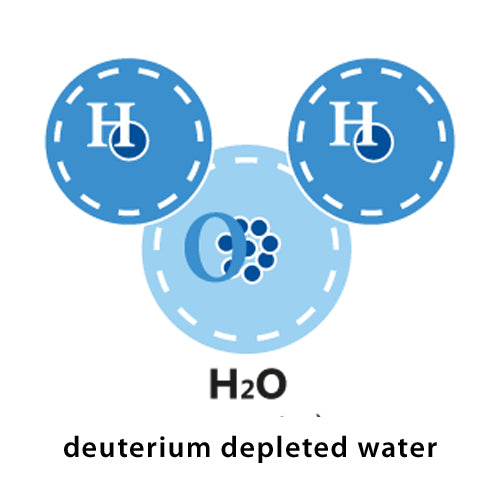Why and How Deuterium Affects Your Body
Here’s why your body’s deuterium levels are probably too high (above 130 ppm):
- Deuterium levels in the water we drink and breathe have been rising for about the past 11,700 years
- Eating carbohydrates and processed foods elevates deuterium in our bodies
- When we get insufficient sleep, sunlight, cold exposure, or exercise, or breathe improperly, we accumulate deuterium
There are at least four key ways deuterium can negatively affect the body:
- Creating unhealthy growth
- Altering three-dimensional structures
- Slowing down chemical reactions (the kinetic isotope effect)
- Damaging mitochondria and breaking ATP nanomotors
1- Deuterium and Growth
Plants, children, and young animals use deuterium for healthy natural growth. But the issue that should concern you is how deuterium can create unhealthy growth. In adulthood, having high levels of deuterium also fosters an environment of growth in your body. Growth “outward” is obesity, and growth in the wrong places in the body is cancerous growth.
2- Three-Dimensional Structures and Deuterium
When you accumulate a lot of deuterium in your body, your cells will begin to use deuterium in place of regular hydrogen. Remember, deuterium can easily go anywhere normal hydrogen goes, in a chemical formula or reaction. Unfortunately, that’s how deuterium alters the 3D shape and the function of molecules in the body.
Here are just a few examples of 3D biomolecules that won’t function correctly when deuterated:
- Cholesterol
- Hormones
- Neurotransmitters
- Cellular receptors
Yes, all of those molecules play critical roles in the body. That’s another reason why deuterium accumulation factors into a lot of severe disease states that seem unrelated, but in fact have a root cause in common.
3- The Kinetic Isotope Effect
Your body uses plain hydrogen (one proton, one electron) in many different chemical reactions. When your body substitutes deuterium in place of hydrogen, these reactions are slowed down because of the kinetic isotope effect (KIE). Due to the KIE, many normal reactions involving carbon and hydrogen will be slowed down by 6–10 times in the body when your deuterium levels are high.
Here are examples of what can happen:
- Enzymatic reactions are slowed down
- Neurotransmitter release and reuptake are slowed down
- Cellular division and repair are slowed down
- Liver metabolism is slowed down
Proper timing at the molecular level is critical to your health. Slowing down reactions is a recipe for disaster. The kinetic isotope effect also causes quantum tunneling, putting deuterium in more places it shouldn’t be.
4- Mitochondrial Health and Deuterium
Energy production is impacted by deuterium, too. Our bodies contain trillions of mitochondria. To produce energy and enable your cells to function correctly, tiny motors inside your mitochondria must spin at 6000–9000 rpm.
The ATP synthase nanomotors use electrons to attract protons (hydrogen ions) then create adenosine triphosphate (ATP, an energy storage molecule), carbon dioxide, and metabolic water.
When deuterium enters the mitochondria in place of hydrogen, the heavy hydrogen can literally break your nanomotors. Broken nanomotors means less energy production and big trouble.
5- Deuterium Depletion and Health
Deuterium depletion means actively lowering your deuterium levels by making changes to diet, lifestyle, and the type of water you drink.
There are several ways to lower deuterium for better health and wellness:
- Fasting and dry fasting lower deuterium
- Ketogenic diet, seasonal ketogenic diet, and low-carb high-fat diets lower deuterium
- Quality sleep in darkness lowers deuterium
- Sunlight, cold exposure, breathwork, and exercise help lower deuterium
- Drinking deuterium-depleted water (DDW) lowers deuterium
6- Deuterium Depletion: Wellness vs. Therapy
Here’s why you may want to deplete deuterium for wellness:
- For better cognition
- To improve energy levels
- To enhance athletic performance and recovery
- To increase your metabolic rate
- To prevent disease
Healthy people typically only need to focus on depleting their deuterium for several months. Then it becomes easier to maintain low levels.
If you are currently fighting disease, deuterium depletion therapy is extraordinarily safe and works in conjunction with conventional standards of care.
It isn’t a new experimental drug with scary side-effects — it’s merely a way of removing something unhealthy from your body.
There are several different ways to deplete deuterium. For best results, you need to implement more than one method.
7- Fasting, Dry Fasting, Keto, and LCHF Deplete Deuterium
You’re probably already familiar with fasting and all the associated health benefits. You may not know that fasting works in part because of deuterium depletion. When you aren’t consuming food, your body switches to fat for fuel. No food means no deuterium coming from carbohydrates, and fat burning means deuterium depletion. The reason fat burning depletes deuterium is because for every kilogram of fat we burn, our body creates 1.1 kg of metabolic water (using hydrogen from the fat, plus oxygen). Metabolic water is created inside our cells and is naturally deuterium-depleted.
Dry fasting is also a highly effective way to deplete deuterium, but it isn’t appropriate for beginners. A dry fast is a fast with no food, water, or liquids. When you dry fast, your body produces metabolic water for hydration. f you dry fast without enough experience, or for too long, you will get dehydrated.
The ketogenic diet or a low-carb high-fat diet is an easy and safe way to deplete deuterium without necessarily fasting. As you reduce your carbohydrate consumption and adapt to using fat as fuel, your deuterium levels will decrease.
8- Sleep, Sunlight, Cold, Oxygen, and Exercise Deplete Deuterium
Sleeping deeply in a dark room helps you deplete deuterium. If you don’t sleep well, you probably have high deuterium levels because you are not depleting enough deuterium at night.
Sunlight also helps our bodies deplete deuterium. The more sun exposure you receive, the easier you can deplete deuterium. That’s one reason why sunlight reduces all-cause mortality, including time-adjusted deaths by cancer, even melanoma.
That’s also why you may want to adopt a seasonal eating pattern and eat locally. Plant photosynthesis in times and places where UV is high tends to create more deuterium in food (carbohydrates), but our bodies can also eliminate it more easily when we get a lot of sunlight.
If you eat out of schedule with the seasons, like consuming bananas in Massachusetts in January, you will increase your body’s deuterium levels.
Cold exposure is another great way to deplete deuterium, especially if you are getting less sun. Cold thermogenesis increases mitochondrial activity through the loosely coupled pathway, activates brown adipose tissue, and liberates fat stores.
Exercise helps deplete deuterium because it increases your metabolic rate, fat burning, and respiration.
Breathing properly — oxygenating tissues — is necessary to deplete deuterium because the aerobic pathways require a lot of oxygen to work.
To enhance deuterium depletion improve your sleep, get exposure to sunlight and cold, exercise regularly, and do breathwork.
These practices probably aren’t enough to lower high deuterium levels (over 130 ppm) all by themselves, but they will improve your results.
If you have low deuterium levels (under 130 ppm), you’ll be able to stay that way by improving depletion mechanisms.
9- Deuterium-Depleted Water or DDW
Deuterium depleted water (DDW) is a powerful tool for deuterium depletion.
You can deplete deuterium without using DDW, but it is useful in the following circumstances:
- If you need to get your deuterium levels lower ASAP
- If you continue eating foods that are higher in deuterium (processed foods and carbohydrates)
- If your body is unable to deplete deuterium on its own due to illness
Technically any water with under 155 ppm deuterium is depleted, but for real impact, you want therapeutic DDW — 125 ppm or less.
For deuterium depletion, drink 1–1.5 liters or more of DDW per day and limit or avoid other liquids.
For wellness, your DDW consumption should stay between approximately 85–125 ppm.
You can dilute Qlarivia with Aquafina as follows:
- 8 parts regular water + 1 part Qlarivia = 140 ppm DDW
- 4 parts regular water + 1 part Qlarivia = 129 ppm DDW
- 3 parts regular water + 1 part Qlarivia = 122 ppm DDW
- 2 parts regular water + 1 part Qlarivia = 111 ppm DDW
- 1 part regular water + 1 part Qlarivia = 90ppm DDW
Some healthy people online are using 25 ppm DDW as a biohack for wellness.
That is a bad idea because they could get their levels lower using less drastic measures. Save the 25 ppm for worst case scenarios.
Again: don’t go below ~90 ppm DDW unless you are a serious decease or can’t achieve acceptable levels using other means.













